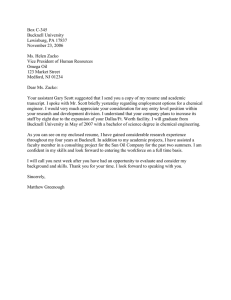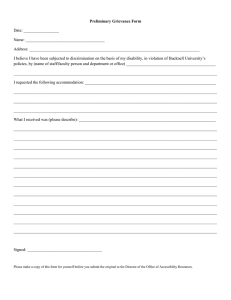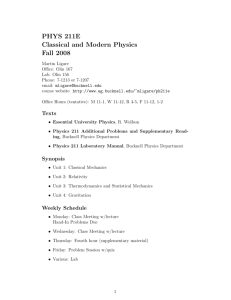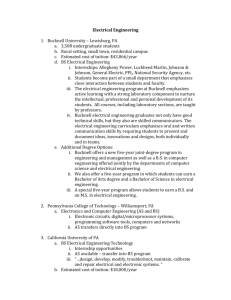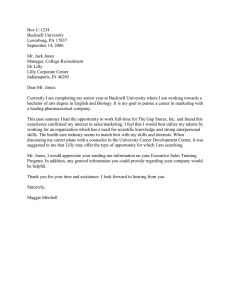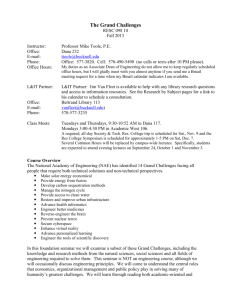Vol 7, Issue 2 - Bucknell University
advertisement
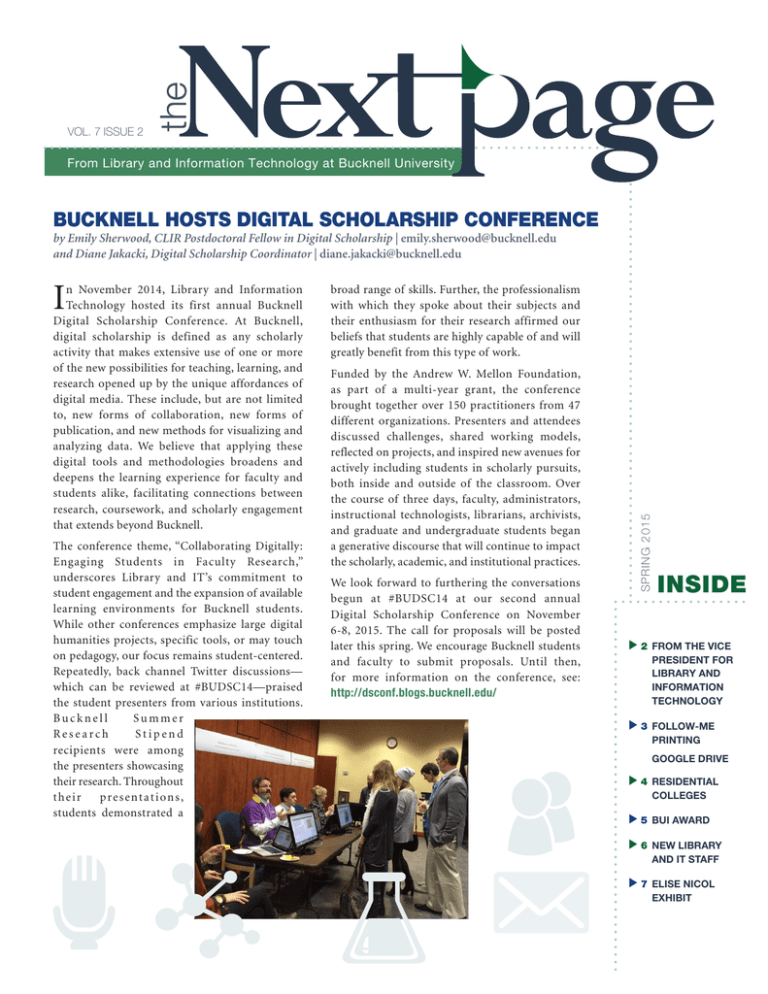
VOL. 7 ISSUE 2 From Library and Information Technology at Bucknell University BUCKNELL HOSTS DIGITAL SCHOLARSHIP CONFERENCE by Emily Sherwood, CLIR Postdoctoral Fellow in Digital Scholarship | emily.sherwood@bucknell.edu and Diane Jakacki, Digital Scholarship Coordinator | diane.jakacki@bucknell.edu n November 2014, Library and Information Technology hosted its first annual Bucknell Digital Scholarship Conference. At Bucknell, digital scholarship is defined as any scholarly activity that makes extensive use of one or more of the new possibilities for teaching, learning, and research opened up by the unique affordances of digital media. These include, but are not limited to, new forms of collaboration, new forms of publication, and new methods for visualizing and analyzing data. We believe that applying these digital tools and methodologies broadens and deepens the learning experience for faculty and students alike, facilitating connections between research, coursework, and scholarly engagement that extends beyond Bucknell. The conference theme, “Collaborating Digitally: Engaging Students in Faculty Research,” underscores Library and IT’s commitment to student engagement and the expansion of available learning environments for Bucknell students. While other conferences emphasize large digital humanities projects, specific tools, or may touch on pedagogy, our focus remains student-centered. Repeatedly, back channel Twitter discussions— which can be reviewed at #BUDSC14—praised the student presenters from various institutions. Bucknell Summer Research Stipend recipients were among the presenters showcasing their research. Throughout their p re s e n t a t i o n s , students demonstrated a broad range of skills. Further, the professionalism with which they spoke about their subjects and their enthusiasm for their research affirmed our beliefs that students are highly capable of and will greatly benefit from this type of work. Funded by the Andrew W. Mellon Foundation, as part of a multi-year grant, the conference brought together over 150 practitioners from 47 different organizations. Presenters and attendees discussed challenges, shared working models, reflected on projects, and inspired new avenues for actively including students in scholarly pursuits, both inside and outside of the classroom. Over the course of three days, faculty, administrators, instructional technologists, librarians, archivists, and graduate and undergraduate students began a generative discourse that will continue to impact the scholarly, academic, and institutional practices. We look forward to furthering the conversations begun at #BUDSC14 at our second annual Digital Scholarship Conference on November 6-8, 2015. The call for proposals will be posted later this spring. We encourage Bucknell students and faculty to submit proposals. Until then, for more information on the conference, see: http://dsconf.blogs.bucknell.edu/ SPRI N G 2015 I INSIDE l 2 FROM THE VICE PRESIDENT FOR LIBRARY AND INFORMATION TECHNOLOGY l 3 FOLLOW-ME PRINTING GOOGLE DRIVE l 4RESIDENTIAL COLLEGES l 5 BUI AWARD l 6 NEW LIBRARY AND IT STAFF l 7 ELISE NICOL EXHIBIT p2 th e N E X T P A GE FROM THE VICE PRESIDENT FOR LIBRARY AND INFORMATION TECHNOLOGY S GORDON WENZEL ince the 2008 economic downturn, the conversations among CIOs have often turned to the perception that Library and IT departments don't have enough resources to keep up with technology on their campuses. Higher education is not known for canceling or sunsetting services, be it on the administrative or academic side. The financial crisis forced CIOs to think strategically and transition some areas of Library and IT organizations from support to partnership. Library and IT departments have increased their attention to the academic side of the house, creating an opportunity for their organizations to become more strategically involved with institutional goals. They can do this by examining staffing, revamping processes, moving products/services to the cloud, and strategically reallocating positions to capitalize on this new academic focus. EDITOR-IN-CHIEF Jason Snyder CONTRIBUTING EDITORS Bud Hiller Tracy Hower Diane Jakacki Carrie Pirmann ART DIRECTOR Debbie Hirsch PHOTOGRAPHER Deb Cook-Balducci VICE PRESIDENT FOR LIBRARY AND INFORMATION TECHNOLOGY Param Bedi The Next Page is published twice a year, in the fall and spring semesters. Copyright 2015, Library and Information Technology, Bucknell University. Website: bucknell.edu/nextpage.xml The economic downturn (and the ensuing financial issues it created) gave us the perfect opportunity to reevaluate workflows, processes, and services. Do we really need to continue offering everything we always have? Just because we did it in 2005 doesn't mean that we need to do it in 2015. Faculty and administration shared a similar mindset and were much more open to having these discussions in the context of the larger strategic vision for technology on campus. Thus, with every initiative considered comes the question: How is this project or initiative going to distinguish my institution? Once Library and IT departments have answered this question, institutions need to determine whether they have the staffing and budget resources to execute the plan. Not every project will pass this test, but it will help ascertain where projects fit with each institution's strategic goals. One such initiative, which exemplifies our strategy, is Digital Scholarship/Humanities. Since 2008, we have more than doubled staff on the Instructional Technology team. None of these are new positions; they have been reallocated from other parts of the organization. The Instructional Technology team’s model has shifted from supporting faculty to partnering with faculty. We hired staff with deep expertise in geographic information systems, digital media and video editing, and digital scholarship; and faculty often ask these staff members to co-teach courses. We also created a Digital Scholarship Center in the library where faculty can experiment with new instructional technologies and meet with instructional technologists. In 2013, we also received a grant from the Andrew W. Mellon foundation to support digital scholarship activities. We have made tremendous progress on working with faculty and students on integrating digital tools in the humanities, social sciences, and other fields. As you will read in this edition, Bucknell hosted a national conference in November 2014, and was recognized by its peers for our approach in engaging undergraduate students in Digital Scholarship, both in the classroom and in research projects. Library and Information Technology Bucknell University, Bertrand Library, Lewisburg, PA 17837 570-577-1557 L I BRARY A N D I N FORMAT I ON T ECHNOLOGY Cheers, Param facebook.com/BucknellLIT twitter.com/BucknellLIT SPRI N G 2015 p3 INTRODUCING FOLLOW-ME PRINTING by Bud Hiller, Technology Desk Manager | dhiller@bucknell.edu I f you’ve printed this semester in the public area of the library, you’ve seen a significant change in the way we are managing printing. Since this change will soon be rolling out across the rest of the campus, this is an excellent opportunity to discuss what Follow-Me printing is all about. In Follow-Me printing, users don’t print to a specific printer. Instead, they print to a web server and release it from any of the printers using the system. Currently, that includes the four Canon printers on the first floor of the library, the Canon in the Langone Center Hearth Space, the Dana lobby, and selected printers in open areas of Academic West. Many more locations will be coming to campus in the next few years, as this will become our primary means of printing. If you’re at a library computer, the web server is preloaded as the default printer, but from personal laptops, students or staff can also go a web page, webprint.bucknell.edu, and upload printing jobs. In addition, users can email documents as attachments to webprint@bucknell.edu. Users then go to any open Follow-Me printer, swipe their ID (or type in their username and password), and release their jobs. Follow-Me Printing AVAILABLE HERE There are a number of advantages to Follow-Me printing that are immediately apparent to anyone who used the previous system, which involved installing individual printers, then selecting one of those printers for a job, then going to that printer and hoping that it wasn’t jammed, out of order, or in use. With Follow-Me printing, no job is printed until it is released, thus eliminating paper waste from unclaimed jobs. In the coming months, Bucknell users should be on the lookout for more printer options across campus. Publications, Print, and Mail and Library and IT are working together to provide those printers and will continue to improve the user experience. Additional benefits of Follow-Me printing: • Printing from mobile devices • Upload print jobs from any device, anywhere in the world • Color printing available for $ .25/page at the library or Langone Center UNLIMITED GOOGLE DRIVE™ STORAGE AT BUCKNELL by Melissa Rycroft, Manager of Technology Training Programs | rycroft@bucknell.edu H ow many files do you have stored in Google Drive? How much space do your files use? If you peek in the bottom left corner of your Drive window, you’ll see a number. Last year, this number would have included a quota (30 GB) and a percentage. In September 2014, Google eliminated the quota for Google Apps for Education customers, which allows us to store as much data as we want in our Google Drive. What can you store in Google Drive? • Google Documents, Spreadsheets, Presentations, and Maps • Microsoft Word Documents, Excel Spreadsheets, and Powerpoint Presentations • PDFs, photos, audio files, and video files Why store your files in Google Drive? • Access your files on your computer, smartphone, tablet, or any device connected to the Internet. • Share a Google Doc with up to 200 editors. Enable simultaneous editing by up to 50 collaborators. • All files uploaded to Google Drive are encrypted. • Google Drive automatically saves every file as you edit, so even if your computer is destroyed, your files are secure and up to date. Do you think you have too many files or your files are too big? • You can upload files up to 5 TB in size (5 TB = 5000 GB = 5000000 MB). • One Bucknell user has 5 TB of data in Google Drive right now! p4 th e N E X T P A GE THREE GREAT THINGS THAT GO GREAT TOGETHER: RESIDENTIAL COLLEGES, LIBRARIANS, AND INFORMATION LITERACY by Kathleen McQuiston, Director of Research Services and Information Literacy | mcquisto@bucknell.edu A Bucknell education provides students with experiences that foster deep engagement. One such high-impact experience is the opportunity to participate in Residential Colleges. Through themed living/learning communities, the Residential College Program provides opportunities for students to become members of a close community of engaged learners, to connect classroom and experiential learning through curricular and co-curricular activities, and to explore competing perspectives and viewpoints both inside and outside the classroom. Reinforce students’ abilities to find, evaluate, and think critically. prepare for the Residential College Symposium and participated in Common Hour activities. Many Senior Fellows encouraged their students to contact their librarian for additional help outside of class. The Senior Fellows agreed that librarian involvement in the Residential Colleges helped foster a supportive learning environment, eased students’ transition to The Colleges are led by Senior Fellows, faculty members who each teach a separate Foundation Seminar, collectively guide weekly Common Hour discussions, organize off-campus trips, and engage in informal conversations with students. Junior Fellows, upperclassmen who live on the residence halls with the first-year students, plan activities and help the first-years get to know campus. Both the Junior and Senior Fellows are there to become mentors for firstyear students. Since librarians partner with faculty to teach information literacy skills within the Foundation Seminars, it seems a natural extension to have them connect with the students at the Residential College level as well. Embedding librarians within the Residential College not only allows focus on the information needs of a specific course, but also builds a stronger relationship with the students and Senior Fellows and provides information literacy instruction that is more personalized. A pilot took place in Fall 2014 with a librarian assigned to each of the Residential Colleges. In addition to providing information literacy instruction at the course level, some Colleges’ librarians helped students university life, and strengthened students’ critical thinking about information sources. The pilot will continue next fall as librarians and Senior and Junior Fellows continue to identify ways that build and reinforce students’ abilities to find, evaluate, and think critically about information sources within the context of the Residential College living/learning communities. Residential Colleges at Bucknell: Arts Humanities Discovery Languages and Cultures Environmental Social Justice Global Society and Technology SPRI N G 2015 p5 BIG DATA, BIG AWARD by Heather Johns, Assistant Director of Media Communications, Division of Communications | heather.johns@bucknell.edu B ucknell University is the only U.S. university to receive a 2015 CIO Impact Award from Frost & Sullivan for its approach to and success with the Bucknell University Intelligence (BUI) project. The CIO Impact Awards honor enterprise teams and individuals that are enabling breakthrough new business models and strategies through the innovative use of transformative technologies. Bucknell was recognized in the Advanced Analytics and Big Data category. “At Bucknell, we saw the opportunity for ongoing analysis of data to shape strategic directions, ensuring a program that is proactive and responsive,” said Param Bedi, Vice President for Library and Information Technology. “This project has been a collaborative initiative across many divisions on campus, and I am most proud of the team effort that has made this a success story for us." Bedi traveled to San Francisco in February to receive the award. Other groups recognized with a CIO Impact Award this year include AARP, BNY Mellon Corp., and AutoTrader Group. BUI project "The BUI project began several years ago with an idea about great things we could do with our data if lots of smart people got together to break down data silos and create a new way of thinking about, defining, and sharing data across our campus," said Assistant Chief Information Officer Mark Yerger. The BUI project has established a data warehouse to facilitate a new open access model that looks at student data holistically rather than as data silos of the registrar, admissions and financial aid offices, and institutional research. Student data "snapshots" have been established for point-in-time, period over period, comparative analytics on metrics such as retention rates and registration counts. "Because we're constantly building on the data work we've already done, as new data is added, the total value of the program accelerates," said Yerger. Next steps for the BUI project include applying its new, validated warehouse data to produce realtime dashboards for the president and provost while expanding the data validation process to other areas of the university such as advancement, finance, and human resources. “This project is creating an environment of openness for sharing data,” said Bedi. “If we think about the data that is generated on campus, the potential for using all forms of data for decision making is huge.” For a complete list of 2015 CIO Impact Award winners, visit: http://tinyurl.com/cioimpact L-R: Mark Yerger, Assistant Chief Information Officer; Param Bedi, Vice President for Library and Information Technology; and Art Robbins, President, Americas & Partner | Frost & Sullivan. As new data is added, the total value of the program accelerates p6 th e N E X T P A GE NEW LIBRARY AND IT STAFF SUSAN MUSSER, Library Services Assistant Susan joined the Research Services team in October as the Library Services Assistant. In addition to 15 years of service as Administrative Assistant to the Director of the Blough-Weis Library at Susquehanna University, and as technical support assistant to the library’s systems librarian, Susan also has a background in finance, having worked for Beneficial Finance and the former Farm Credit Union. She majored in Speech Communications and minored in Religion at Susquehanna University. Susan grew up on a farm in Snyder County, and she and her husband Ed reside south of Port Trevorton. In their spare time, they can be found on the family farm, at Shady Nook, kayaking on the Susquehanna River, or spending time with their three children Erin, Jan, and David, as well as their new grandson Charlie. MIKE LATORRE, Business Intelligence Analyst Mike joined Library and IT in January as a Business Intelligence Analyst working on the Bucknell University Intelligence project. Prior to joining the Bucknell community, he worked for three years as a Business Intelligence Developer at Geisinger Health System. His roots are in the coal region of central Pennsylvania, and he received his bachelor’s degree in Finance from Susquehanna University. Mike enjoys working in the close knit environment Bucknell offers and is looking forward to supporting the University’s decision-making through analytics and data-driven solutions. In his free time, he enjoys staying active, playing PS4, and working on home improvement projects, regardless of how nervous it makes his fiancée. JILL HALLAM-MILLER, Blended Learning Librarian Jill joined Library and IT in February as the Blended Learning Librarian in Research Services. She holds a BA in Humanities from the University of Maryland University College, an MS in Library Science from Clarion University of Pennsylvania, and is pursuing a Masters in Educational Technology through Boise State University. Prior to coming to Bucknell, Jill served as Reference and Instruction Librarian at Central Penn College, where she developed and implemented the information literacy program. She eagerly anticipates collaborating with faculty, students, and other librarians at Bucknell in the quest to make the research process more interesting and accessible. In her spare time, Jill enjoys training (which is more like playing with) her two Australian shepherds, Odin and Granite, and she is excited to be teaching her first training class for new dog owners in April. SPRI N G 2015 STOP BY TO SEE OUR NEW EXHIBIT! You’re Always Brilliant in the Morning Collages, photomontages and other works on paper by ELISE NICOL Blanchard Gummo Gallery | The Ellen Clarke Bertrand Library | Bucknell University February 2 – April 18, 2015 Do images piled atop one another deny or define what's underneath? Do collaged layers invite you to look at them as a whole? Or do you look through and around a pieced-together image instead of just at it? What happens when two images bump up against one another? Or words bump up against an image? Is it unexpected? Unsettling? Strange? Revealing? Funny? This exhibition plays with these questions, bringing together 35 works from four series created since 2012: • • • • photographs made for a collaborative book project with the artist's brother, the poet Alfred Nicol abstract, postcard-size, one-a-day pigment prints larger, more experimental pigment prints and new drawings, collages, and photomontages. elisenicol.com Library and IT by the Numbers (Academic Year 2013-2014) TECHNOLOGY: Completed technology support cases: 5,823 Gigabytes of data transferred on a typical day: 71,880.75 Number of wireless devices on Bucknell’s network on a typical day: 4,950 Number of telephones replaced with new VOIP models: 1,800 LIBRARY: Entrances and exits to/from Bertrand Library: 558,563 Research inquiries in Special Collections/University Archives: 250 Library items circulated: 47,618 Number of information literacy sessions taught by librarians: 246 Number of students attending information literacy sessions: 4,674 Research by Subject guide page views: 168,200 In-depth research consultations with students: 374 p7 Benjamin Hoover Kathleen McQuiston ntment Schedule an Appoi Jason Snyder Jim Van Fleet Carrie Pirmann t Schedule an Appointmen Schedule an Appoi ntment Schedule an Appointmen t Chloe Barnett Photography by Ryan LeBreton Schedule an Appointment Nancy Frazier Finals are coming! Martha Holland Get research help from a subject specialist by visiting researchbysubject.bucknell.edu. Schedule a research appointment or get help via live chat!
